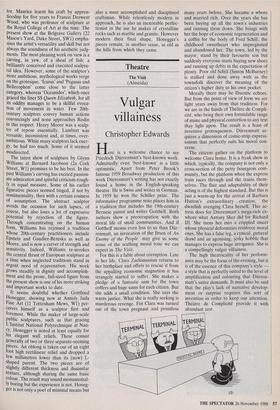Theatre
The Visit (Almeida)
Vulgar villainess
Christopher Edwards
Here is a welcome chance to see Friedrich Diirrenmatt's best-known work. Admittedly even 'best-known' is a little optimistic. Apart from Peter Brook's famous 1959 Broadway production of this work Durrenmatt's writing has not exactly found a home in the English-speaking theatre. He is Swiss and writes in German. In 1959 he won the Schiller prize. The informative programme note places him in a tradition that includes the 19th-century Bernese pastor and writer Gotthelf. Both authors show a preoccupation with the moral life of small communities. And if Gotthelf means even less to us than Diir- renmatt, an invocation of the Ibsen of An Enemy of the People may give us some sense of the scathing moral tone we can expect in The Visit.
For this is a fable about corruption. Late in her life, Clara Zachanassian returns to her birthplace and offers to rescue it from the appalling economic stagnation it has strangely started to suffer. She makes a pledge of a fantastic sum for the town coffers and huge sums for each citizen. But she adds a small condition. She says she wants justice. What she is really seeking is murderous revenge. For Clara was turned out of the town pregnant and penniless many years before. She became a whore and married rich. Over the years she has been buying up all the town's industries and running them down. She brings with her the hope of economic regeneration and a coffin for the body of Fred Schill, the childhood sweetheart who impregnated and abandoned her. The town, led by the mayor, stand by their favourite son but suddenly everyone starts buying new shoes and running up debts in the expectation of plenty. Poor old Schill (Simon McBurney) is stalked and done away with as the townsfolk discover the meaning of the citizen's higher duty to his own pocket.
Morally there may be Ibsenite echoes. But from the point of view of form we are light years away from that tradition. For we are in the hands of Theatre de Compli- cite, who bring their own formidable range of mime and physical contortion to any text thay light upon. The result is a feast of inventive grotesqueness. Diirrenmatt ac- quires a dimension of comic-strip express- ionism that perfectly suits his moral con- cerns.
The citizens gather on the platform to welcome Clara home. It is a freak show in which, typically, the company is not only a cross-section of the petty bourgeois com- munity, but the platform when the express train races through and the trains them- selves. The flair and adaptability of their acting is of the highest standard. But this is just a warm-up for the arrival of Barbara Hutton's extraordinary creation, the dwarfish avenging Clara herself. This ac- tress does for Dfirrenmatt's mega-rich ex- whore what Antony Sher did for Richard III. She turns her into a crippled insect whose physical deformities reinforce moral ones. She has a false leg, a cynical, gutteral drawl and an agonising, jerky hobble that manages to express huge arrogance. She is a compellingly vulgar villainess.
The high theatricality of her perform- ance may be the focus of the evening, but it is of the essence of this company's style a style that is perfectly suited to the level of amplification and colouring that Diirren- matt's satire demands. It must also be said that the play's lack of narrative develop- ment or surprise requires this sort of invention in order to keep our attention. Theatre de Complicite provide it with abundant zest.










































































 Previous page
Previous page